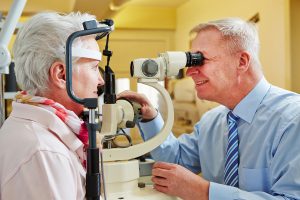Her vision was fine. In fact, she often bragged about the fact that she’d missed the late-forty reading eyeglass prescription so many of her peers endured. Nevertheless, her daughter kept pestering her about making an appointment with her eye doctor. But really, with all the other physical ailments she was concerned with—the arthritis creeping into her fingers and back and the diabetes that had taken her favorite snacks away, who had time?
[caption id="attachment_902" align="alignright" width="300"] Home Care Massapequa NY - The Sneak Thief of Sight[/caption]
Home Care Massapequa NY - The Sneak Thief of Sight[/caption]
Five years later, she almost hit a pedestrian walking across the street. She wasn’t even aware of him until he banged on her window. This time, she heeded her daughter’s strong suggestion that she go see an ophthalmologist. Two days later she was sitting in his office after completing a comprehensive eye exam when he told her she had glaucoma, and that it had already taken part of her peripheral vision away and would eventually steal the rest of her sight unless she started immediate treatment.
Glaucoma
Glaucoma is often referred to as the “sneak thief of sight.” There are few early warning signs and, once noticed, significant vision loss has occurred and is irreversible. Treatment consists of eye drops, pills, laser surgery, or traditional surgery. The aim is to control the pressure build-up in the eyes, which is putting pressure on and damaging the optic nerve. Surgery is usually a last option if medications are not keeping the eye pressure in check. There are several recent advancements in surgical techniques that are proving promising including the trabectome and canaloplasty. The Glaucoma Foundation is an excellent source of information for any new treatments on the horizon.
Diet and Exercise
While medical treatment is vital in order to limit further damage to the eye and loss of vision, there are some lifestyle approaches your parent can take to help the cause. A diet high in anti-oxidant rich fruits and vegetables is recommended, particularly those with carotenoids such as orange and yellow peppers. Blueberries and cherries are good for the eyes as well as wild-caught salmon, high in omega-3 fatty acids.
Specific supplements that Dr. Axe recommends are bilberry, astaxanthin, fish oil, CoQ10 and magnesium. As supplements can interact with prescription medicine, it is always best to check with your parent’s primary health care provider before adding supplements to their diet.
Exercise improves the circulation and tends to lower the intraocular pressure. Aerobic exercise, in particular, has been shown to be beneficial. Aim for 30 minutes of brisk walking or other type of exercise such as stationary bicycling most days of the week.
Home Care Provider
If your loved one needs assistance with the everyday activities of living, consider obtaining the services of a senior home care provider. In addition to daily tasks, they can provide transportation, accompany your parent on daily walks, and prepare eye-healthy meals that are then shared and enjoyed together.
Resources: https://www.glaucomafoundation.org/treating_glaucoma.htm
https://draxe.com/glaucoma-natural-treatment-prevention/
